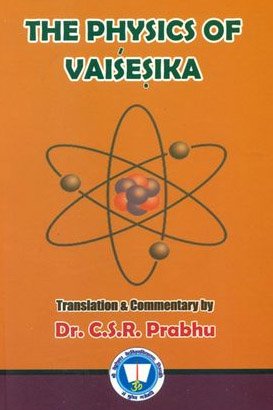Dravatva: 9 definitions
Introduction:
Dravatva means something in Hinduism, Sanskrit. If you want to know the exact meaning, history, etymology or English translation of this term then check out the descriptions on this page. Add your comment or reference to a book if you want to contribute to this summary article.
In Hinduism
Vaisheshika (school of philosophy)
Source: Wisdom Library: VaiśeṣikaDravatva (द्रवत्व, “fluidity”) is one of the additional guṇas (‘qualities’) added by Praśastapāda, on top of the seventeen guṇas in the Vaiśeṣika-sūtras. These guṇas are considered as a category of padārtha (“metaphysical correlate”). These padārthas represent everything that exists which can be cognized and named. Together with their subdivisions, they attempt to explain the nature of the universe and the existence of living beings.

Vaisheshika (वैशेषिक, vaiśeṣika) refers to a school of orthodox Hindu philosophy (astika), drawing its subject-matter from the Upanishads. Vaisheshika deals with subjects such as logic, epistemology, philosophy and expounds concepts similar to Buddhism in nature
Nyaya (school of philosophy)
Source: Shodhganga: A study of Nyāya-vaiśeṣika categoriesDravatva (द्रवत्व, “fluidity”) or Dravatvaguṇa refers to one of the twenty-four guṇas (qualities) according to Praśastapāda and all the modern works on Nyāya-Vaiśeṣika.—Dravatva (fluidity) is a quality (guṇa) which is defined by Praśastapāda as that which is the cause of the act of the flowing. It inheres in three substances namely earth, water and light. Viśvanātha also gives the similar definition of dravatva, but he makes the specification that cause here means non-inherent cause. Moreover, he says that dravatva is efficient cause (nimitta) in the formation of a lump. Śivāditya’s definition follows the line which he has taken in defining other guṇas. Thus he says dravatva is that which possesses the generality of dravatva and which is the noninherent cause of flowing. However, in his view dravatva resides in only one substance, which is marked difference from other Nyāya-Vaiśeṣika.
Annaṃbhaṭṭa also follows the similar line. But he makes one addition. In his view dravatva is known the asamavāyikāraṇa of the first act of flowing of a liquid substance. So dravatva causes the first act of flowing while the subsequent acts are caused by velocity. It remains in earth, water and light.
The Nyāya-Vaiśeṣikas accept two kinds of dravatva, viz., sāṃsiddhika (natural) and naimittika (artificial). Artificial fluidity is caused by contact of fire. Natural fluidity is found in water only. Artificial fluidity resides in pṛthivī (earth) and tejas (light). Clarified butter, which are varieties of earth attain liquid state when come in contact with fire. Similarly fire in the form of gold also becomes liquid due to conjunction with heat.

Nyaya (न्याय, nyaya) refers to a school of Hindu philosophy (astika), drawing its subject-matter from the Upanishads. The Nyaya philosophy is known for its theories on logic, methodology and epistemology, however, it is closely related with Vaisheshika in terms of metaphysics.
Languages of India and abroad
Sanskrit dictionary
Source: Cologne Digital Sanskrit Dictionaries: Shabda-Sagara Sanskrit-English DictionaryDravatva (द्रवत्व).—n.
(-tvaṃ) 1. Fluidity, natural or artificial. 2. Distillation. 3. Fusion. E. drava, and tva affix; also with tal dravatā . dravasya bhāvaḥ .
Source: Cologne Digital Sanskrit Dictionaries: Benfey Sanskrit-English DictionaryDravatva (द्रवत्व).—[drava + tva], n. 1. Fluidity, Bhāṣāp. 153 (ºtva + ka in 30). 2. Fusibility, [Hitopadeśa] i. [distich] 87.
Source: Cologne Digital Sanskrit Dictionaries: Monier-Williams Sanskrit-English DictionaryDravatva (द्रवत्व):—[=drava-tva] [from drava] ([Hitopadeśa]) n. natural or artificial fluid condition of a substance, fluidity, wetness.
Source: Cologne Digital Sanskrit Dictionaries: Yates Sanskrit-English DictionaryDravatva (द्रवत्व):—(tvaṃ) 1. n. Fluidity.
[Sanskrit to German]
Sanskrit, also spelled संस्कृतम् (saṃskṛtam), is an ancient language of India commonly seen as the grandmother of the Indo-European language family (even English!). Closely allied with Prakrit and Pali, Sanskrit is more exhaustive in both grammar and terms and has the most extensive collection of literature in the world, greatly surpassing its sister-languages Greek and Latin.
Kannada-English dictionary
Source: Alar: Kannada-English corpusDravatva (ದ್ರವತ್ವ):—
1) [noun] the quality of being able to be liquefied.
2) [noun] the quality or condition of being a liquid.
Kannada is a Dravidian language (as opposed to the Indo-European language family) mainly spoken in the southwestern region of India.
See also (Relevant definitions)
Starts with: Dravatvaka.
Full-text: Tiravattuvam, Ekadashatejoguna, Guna, Khakkhatatva, Sneha, Tathata, Tva, Nimitta.
Relevant text
Search found 14 books and stories containing Dravatva, Drava-tva; (plurals include: Dravatvas, tvas). You can also click to the full overview containing English textual excerpts. Below are direct links for the most relevant articles:
Nyaya-Vaisheshika categories (Study) (by Diptimani Goswami)
Qualities (13): Dravatva (Fluidity) < [Chapter 4 - Quality and Action]
Qualities (14): Sneha (Viscidity) < [Chapter 4 - Quality and Action]
Divisions of Quality < [Chapter 4 - Quality and Action]
Philosophy of Charaka-samhita (by Asokan. G)
Twenty general physical attributes < [Chapter 2 - Fundamental Categories]
Enumeration of attributes (guṇa) < [Chapter 2 - Fundamental Categories]
Padarthadharmasamgraha and Nyayakandali (by Ganganatha Jha)
Text 130 < [Chapter 6a - On Qualities]
Text 150 < [Chapter 6a - On Actions]
Text 37: Of Water < [Chapter 4 - Of Special Substances]
Bhakti-rasamrta-sindhu (by Śrīla Rūpa Gosvāmī)
Verse 2.4.265 < [Part 4 - Transient Ecstatic Disturbances (vyābhicāri-bhāva)]
Vaisheshika-sutra with Commentary (by Nandalal Sinha)
Sūtra 2.1.6 (Objection to Fluidity being a characteristic of Water, answered) < [Chapter 1 - Of Earth, Waters, Fire, Air, and Ether]
Sūtra 2.1.7 (Above continued) < [Chapter 1 - Of Earth, Waters, Fire, Air, and Ether]
Chaitanya Bhagavata (by Bhumipati Dāsa)
Verse 3.9.387 < [Chapter 9 - The Glories of Advaita]
Verse 2.13.44 < [Chapter 13 - The Deliverance of Jagāi and Mādhāi]
Verse 2.10.36 < [Chapter 10 - Conclusion of the Lord’s Mahā-prakāśa Pastimes]